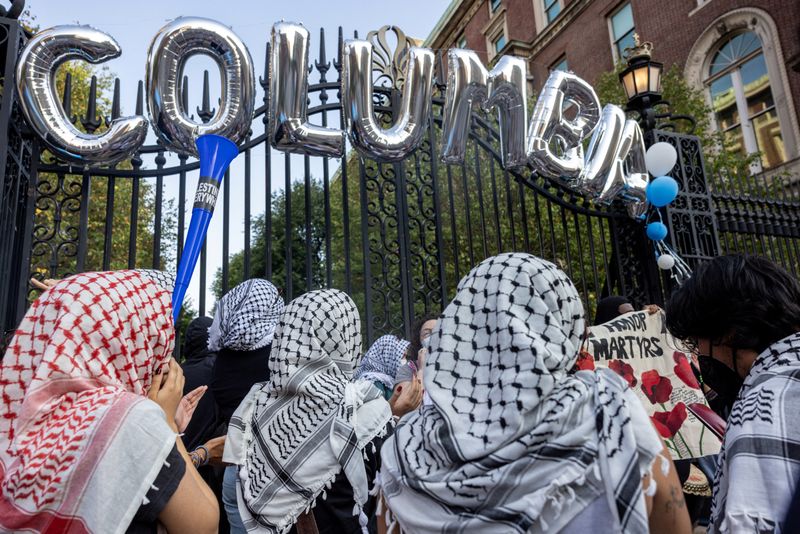As students and protests return to campus, Columbia tries new restrictions, leadership
2024.08.30 06:18
By Jonathan Allen
NEW YORK (Reuters) – The new school year is still days away, but student protesters have already made a noisy return to Columbia University’s New York campus, the epicenter of a pro-Palestinian protest movement that spread to schools around the world this spring.
Blowing whistles and banging drums, pots and pans and the iron railings of the closed campus gates, about 50 protesters marched on the sidewalk on Sunday evening and bellowed pro-Palestinian chants. A New York Police Department surveillance drone hovered over their heads.
Inside the gates, more than 1,000 new Columbia undergraduates had gathered for a convocation ceremony. Dr. Katrina Armstrong, Columbia’s new interim president, was able to make herself heard over the protesters’ din, describing to the new students her vision of the campus as a place of open debate where no one feels excluded.
Columbia administrators are hoping to avoid a repeat of the protests that roiled the university earlier this year, which culminated with hundreds of armed police officers sweeping the campus in April to arrest more than 30 student protesters who had barricaded themselves inside an academic building.
Since the spring, college administrators across the U.S. and beyond have grappled with tent encampments inspired by the Columbia protests spreading to their own campuses, followed by pro-Israel counterprotests. Some administrators also called in police; a minority have reached agreements over demands to sever financial ties with Israel.
“Effectively managing protests and demonstrations allows us to advance our educational and research missions while enabling free speech and debate,” Armstrong, the dean of Columbia’s medical school, wrote in a campus-wide email last week.
She has been interim leader since Minouche Shafik resigned as president earlier this month after facing criticism over handling of the protests, including a vote of no confidence by Arts and Sciences faculty angered by her decision to call in police to arrest students.
The pro-Palestinian protests have been led by Columbia University Apartheid Divest (CUAD), a coalition of student groups demanding the school end its investments in weapons manufacturers and other companies that support Israel’s military occupation of Palestinian territories.
Over the summer, mediators had little success trying to revive negotiations between Columbia administration and CUAD, according to Mahmoud Khalil, a Palestinian graduate student who is one of the main negotiators on behalf of CUAD.
“The university should actually deal with the students as students, not as a threat to Columbia and the Columbia brand,” he said. Columbia declined requests to interview administration officials and a spokesperson declined to answer questions about the talks with CUAD.
CHANGES TO CAMPUS
As faculty and students return to Columbia ahead of classes resuming on Tuesday, they are already noticing new restrictions and other changes to its campus.
The hedge-lined south lawns that had been yellowed by tent encampments are now lush and green, with public safety officers guarding the entrances and new signs noting that camping is banned by school rules.
Gates to the campus that have been kept open for decades to the surrounding city streets are closed under a new system restricting access, with guards allowing in only those with Columbia ID and pre-registered guests.
Most days, CUAD students set up a small table draped with a Palestinian flag to the side of one of the main campus entrances, handing out flyers and pamphlets, some designed with new students in mind.
Across campus, officials have set up fences and gates on wheels which can be rolled across walkways to cordon off small areas. A group of senior officers from the New York Police Department inspected the cordons during a campus tour last week.
Mariam Jallow, the incoming elected president of the Columbia College Student Council, said she was optimistic about the new leadership.
“It’s a fresh start that we really need,” Jallow, a history major, said of Armstrong. “She doesn’t have a lot of the burdens that President Shafik had, and there’s still a lot of grievances and grudges held from last year.”
Jallow, who is not a part of CUAD, said it was not easy representing a diverse group of students, but noted that the main demands of CUAD, which was formed in 2016, had long had broad support among students at Columbia’s main undergraduate school. CUAD called for a referendum of Columbia College students in 2020, and about 60% voted in support of Columbia divesting from Israel; that rose to about 76% in an April referendum.

Over the summer, Columbia administrators continued disciplinary proceedings against more than 60 students, including Khalil, accused of breaking campus rules with their involvement in CUAD protests.
Some students say the university is dragging out the investigations to discourage protests. A Columbia spokesperson said the school was “working to expedite” the investigations.








